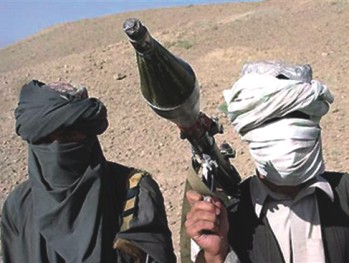Neighbours
Life after the Taliban
Ashfaq Yusufzai from Peshawar
Pakistani forces have advanced into Taliban hideouts this week, killing scores of militants and displacing civilians. A retaliation after a series of attacks rocked key cities. While the war on terror has been erupting, innocent Pakistanis in the midst of this fighting are the ones badly affected. In areas where Taliban control has been eradicated, life continues but fears still linger. These fears are not unfounded
“Life under the Taliban was like hell. They destroyed our school and the video shop of my father. Now we are again marching towards peace, but fears of the Taliban persist,” said 11-year-old Ayesha.
The Grade 5 student from Mingora, Swat Valley was only one of around 90,000 children who were force to quit school when the Taliban blew up their schools in January. A total of 188 girls' schools and 97 for boys were destroyed between February 2008 and March 2009 in Swat district, forcing the students to stay home or flee to safer places to continue their studies.
All that has changed. ”Today, we are in school and happy,” she said, beaming.
The Taliban extended their activities to settled districts of North West Frontier Province (NWFP) from the Federally Administered Tribal Area, where they had crossed over to Pakistan after the dismissal of their government in Kabul by the end of 2001.
They virtually ruled the Swat district of the NWFP from April 2008 to May 2009 until the army launched full-scale operations to annihilate them. By June, they were a spent force.
Aside from schools, the entertainment industry in Swat suffered a great deal as well. Considering dancing and music un-Islamic, the Taliban destroyed about 500 music centres and even outlawed listening to music on vehicle stereos.
“We have started our CD shops again. People are coming enthusiastically. We are feeling great,” said Sher Dil Khan, president of the CD and Music Shops Association.
Khan said that dread of the Taliban among the association's members persists, although the government's decision to establish a permanent cantonment, or military quarters, in Swat has allayed their fears somehow.
The lingering fear among some people has its reasons. Khan still recalls an incident in early January, when the Taliban brutally slaughtered a popular dancer. Her body was left hanging from an electricity post to send the message to that those indulging in dancing would suffer the same fate.
Yet others simply choose to savour their newfound freedom, or so it seems.
Eighteen-year-old Kajol Begum, who described herself as a professional dancer, was forced to flee to Peshawar for fear of the Taliban. ”But now we are back in Swat,” she said in a phone interview with IPS. ”Last night we (referring to herself and her sister) performed at a wedding ceremony in Mingora city (in Swat).
Elsewhere in Swat, two cinema houses that had remained closed for more than one year have reopened.
“We suffered huge losses during the Taliban regime, but now there is a ray of hope after the successful military operations against the militants,” said Jamal Sher, manager of the Swat Cinema.
Moviegoers came in droves when Swat and Palwasha cinemas reopened on August 10. 'Lathi'--or baton-wielding police had to be deployed to control the crowd. ”We are running four shows every day, because the people yearn to watch movies,” he told IPS.
Similar scenes played out elsewhere in the vast Swat valley. The 400-bed Saidu Teaching Hospital in Swat had to close down because no doctors, nurses and paramedics were willing to perform their duties, fearful for their lives. ”Nurses and lady doctors had been warned by the Taliban to quit their jobs or face deaths,” said Dr Lal Noor, hospital administrator.
But once the Taliban were gone, the hospital staff returned to their posts.
Today, the medical facility is “receiving 500 patients every day,” said Dr Noor.
And whereas shopkeepers were prevented by the Taliban from accommodating women customers, now they are enjoying brisk sales, mostly from women.
“(Under the Taliban) we had to display banners inscribed with words 'Women Customers Are Not Allowed,' that had cut our sale in half,” said Sherin Gul of the Swat Traders Association. Today, it is a totally different scenario.
“We have now herds of women buyers who throng the market every day to shop,” he said. “The military operations and subsequent elimination (of the Taliban) brought relief to about 400,000 women of Swat,” said Kashmala Zameer, 26, over telephone from the office of Gul.
Markets that were deserted during the Taliban era are now hustling and bustling as well with activities. More people have been turning out in commercial sites with the Sep. 30 lifting of the occasional curfew in Swat by the army
A grand musical show telecast by the Pakistan Television (PTV) from Mingora on August 14 Pakistan's Independence Day signalled an auspicious beginning in post-Taliban Swat as people came out of their houses, cheering and dancing to the music the whole night.
“We were under tremendous pressure to postpone the show. There were fears that the Taliban would send suicide bombers, but we went ahead with it, and it turned out to be a great success,” PTV general manager Majeedullah Khalil told IPS in Peshawar.
The people of Swat may have thrown themselves into frenzied activity--signs of a vibrant life emerging in a once strife-torn setting--others are not entirely free of uncertainties. “We (believe) that the Taliban would re-emerge here,” said Begum, the professional dancer, in a tone that seemed to disguise her anxiety.
“Many of our relatives are still reluctant to come back to Swat because they afraid of the Taliban,” she added. Some are in Mardan while others have stayed behind in Charsadda, Peshawar and Nowshera districts.
Source: IPS Asia-Pacific
Copyright
(R) thedailystar.net 2009 |
